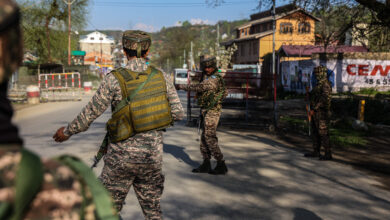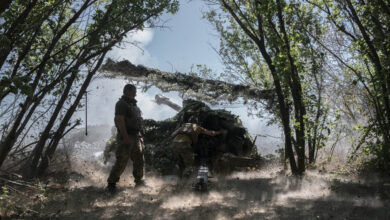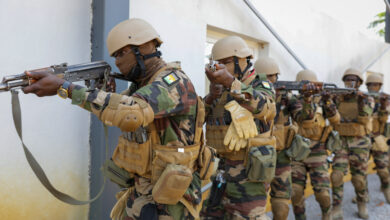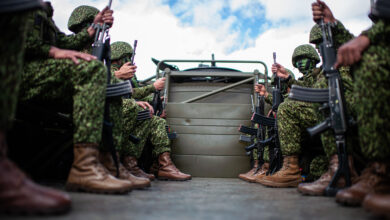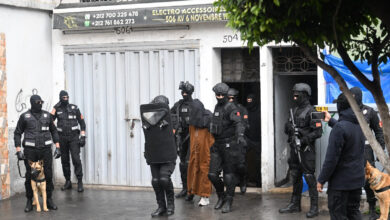Militants killed 23 Malian soldiers in a raid on an army camp in central Mali, a dawn attack that the armed forces believe was led by a deserter.
Driving cars and motorbikes, the attackers stormed Dioura army camp in the Mopti region, on Sunday, March 17, in the latest assault on the military as the country grapples with the spread of extremist groups and instability.
“The provisional toll is 21 bodies discovered,” said a military source, in figures also confirmed by a local legislator.
There was “a lot of damage,” a second military source said. “Our men responded. I saw at least four bodies on the ground,” he said.
Citing unnamed sources, Mali’s AMAP news agency put the death toll at 20, saying that extensive material damage was caused after unidentified gunmen attacked the camp in Dioura.
The attack, which began at around 6 a.m. was carried out “by terrorist groups under the command of Ba Ag Moussa, a deserter army colonel,” according to the Armed Forces of Mali (FAMa).
Military aviation and ground reinforcements were sent to the base, FAMa said.
The attack caused “material damage and loss of life,” FAMa said, adding that adding that an assessment of the situation was ongoing.
Update March 18 FAMa said that “23 brothers in arms” were killed in the attack.
Minusma, the U.N. peacekeeping mission in Mali, said it had organized the medical evacuation of “several wounded” as part of its mutual assistance with Mali’s armed forces.
Update March 23 The Support Group for Islam and Muslims (JNIM) claimed responsibility for the assault on what it described as “barracks of the G5 [Sahel] forces,” saying it was in response to attacks on the Fulani people.
It said around 30 soldiers including the battalion commander were killed, and the base and eight vehicles were burned.
Refuting the FAMa statement, it said the assault was led by Amadou Kouffa, and not “the commander Abah Moussa.”
JNIM formed in March 2017, when several smaller groups including the Sahara branch of Al-Qaeda in the Islamic Maghreb, Ansar Dine and Al-Mourabitoun merged. JNIM’s leadership has pledged allegiance to Al-Qaeda leader Ayman al-Zawahiri.
President Ibrahim Boubakar Keita in a tweet said the Malian people were “united against terrible acts,” without giving any death toll.
The attack comes less than a week after at least six Malian soldiers were killed when their vehicles were struck by improvised explosive devices, also in the Mopti region, on March 12.
And on March 10, French forces deployed to Operation Barkhane were attacked in the Akabar area of Mali’s eastern Menaka region, near the border with Niger. Four French personnel were injured, the General Staff of the Armed Forces said.
The recent unrest in the Sahel began in Mali in 2012 with Tuareg separatist uprising against the state, which was exploited by Islamist extremists linked to al-Qaeda who took key cities in the desert north.
France began its Operation Serval military intervention in its former colony early the next year, driving the jihadists from the towns, but the militant groups morphed into more nimble formations operating in rural areas, sometimes winning over local populations by providing basic services and protection from bandits.
The insurgency has gradually spread to central and southern regions of Mali, and across the borders into neighboring Burkina Faso and Niger.
Large swathes of the country remain outside government control, despite a 2015 peace accord designed to isolate the Islamists.
The French mission evolved into the current Operation Barkhane, which has roughly 4,500 personnel deployed with a mandate for counter-terrorism operations across the region.
The U.N. Security Council is planning a March visit to Mali for a closer look at the conflict as it faces a June deadline to extend the mandate of the Minusma peacekeeping force. The Minusma mission began in 2013 and has about 12,000 troops and 1,750 police deployed.
Earlier this month, U.N. Secretary-General Antonio Guterres warned in a report that security is worsening in the country, with terror attacks on the rise, targeting U.N. peacekeepers, Malian troops, international forces and civilians.
In 2018, there were 237 terror attacks, up from 226 in 2017 and 183 in 2016, said the report.
In January, 10 Minusma peacekeepers from Chad were killed in an attack on their base in Aguelhok, in the northern Kidal region. Five days later, two peacekeepers from Sri Lanka died and six were injured near Douentza in Mopti after their vehicle hit a mine. A peacekeeper from Burkina Faso was injured in a separate roadside bomb attack near Douentza the previous day.
In all, 18 peacekeepers have been killed and 77 others injured in attacks in the past six months, the report said.
France, which will lead the council visit to Mali along with Germany, is pushing for additional funding to shore up the G5 Sahel Joint Force that was set up by Burkina Faso, Chad, Mali, Mauritania and Niger in 2015, an initiative which was spearheaded by France.
On March 1, nine Malian soldiers attached to the G5 Sahel Joint Force were killed when a vehicle in which they were traveling was struck by a roadside bomb in Boulkessi in the Mopti region near the border with Burkina Faso.
With reporting from AFP




